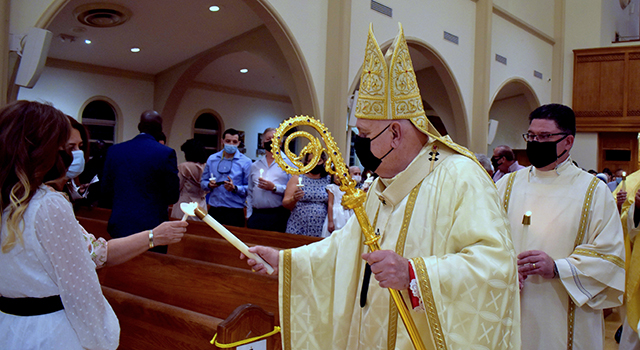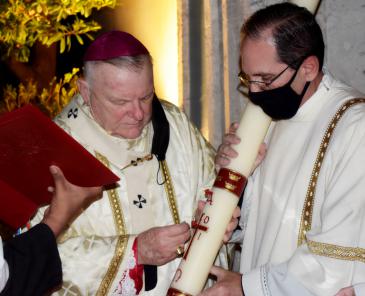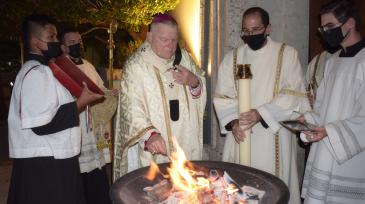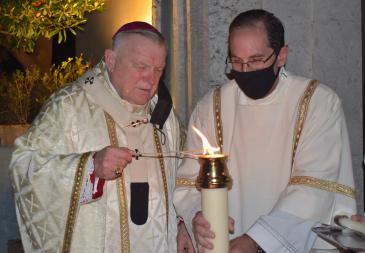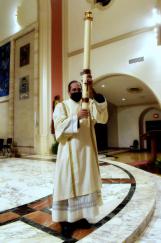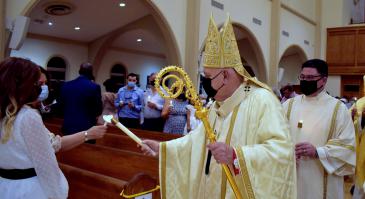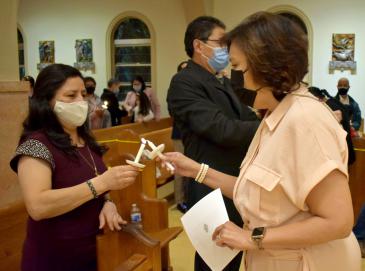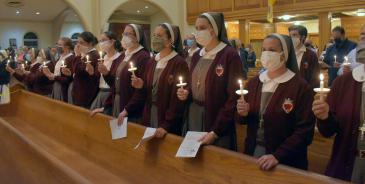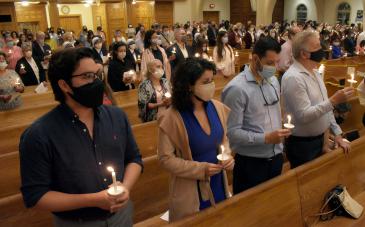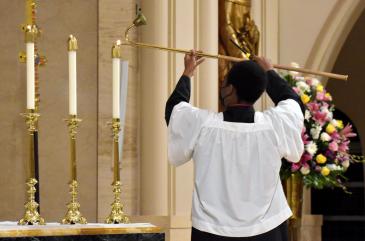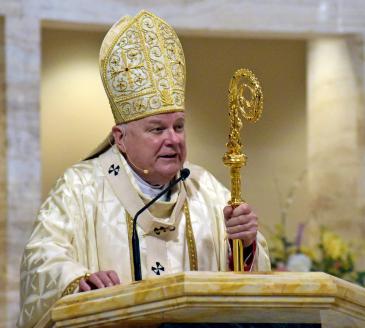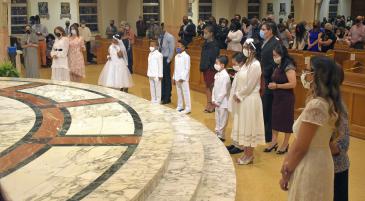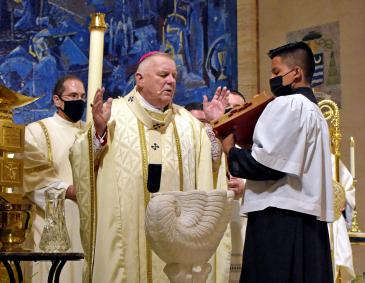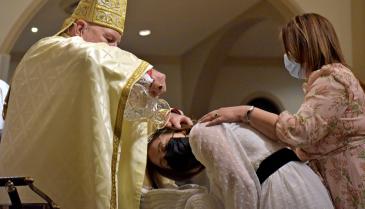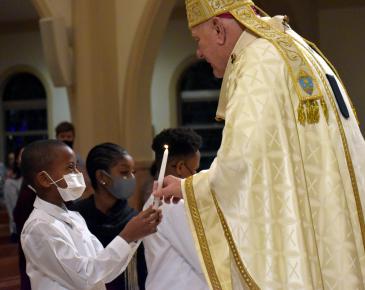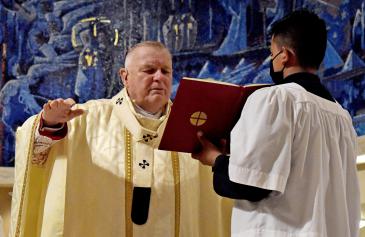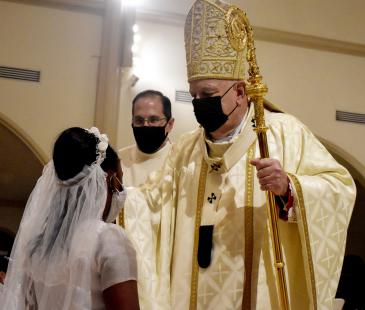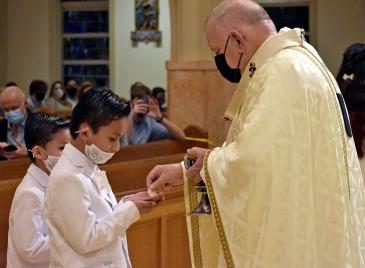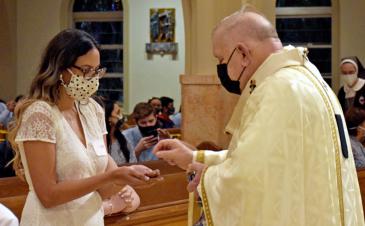By Archbishop Thomas Wenski - The Archdiocese of Miami
Photography: JIM DAVIS | FC
Archbishop Thomas Wenski preached this homily during the Easter Vigil he celebrated at St. Mary Cathedral, April 3, 2021.
Our vigil began with a reading from the Book of Genesis. The Genesis story is the story of creation when God said, “Let there be light.” The Easter Story is the story of our re-creation. We celebrate that with Jesus’ rising from the dead, God said again, “Let there be light.”
The Paschal candle symbolizes the light that is Jesus Christ who, though once crucified, now lives. “This is a light that lives from sacrifice. The candle shines as it is burnt up. It gives light, inasmuch as it gives itself.” Christ who gave himself for us on the Cross by his resurrection brings a new light into the world – a light that dispels the darkness of sin and death that seemingly would overwhelm the world.
This darkness is seen in the wars that still beset our planet, in this pandemic that has taken too many lives, in the poverty that dehumanizes too many members of the human family; this darkness is seen in the fragile and broken relationships that divide us and prevent us from recognizing each other as children of the one Father, brothers and sisters to one another.
On that early Sunday morning the angels told the women who went to the tomb to anoint Jesus’ body, “Why do you seek the living among the dead?” This question is also asked of us. Having been enlightened by the light of Faith, we too are challenged to no longer seek life among the dead, no longer to exchange true life which is ours in Jesus Christ for its counterfeits proposed by the world through the vain pursuit of power, pleasure and wealth. The question, “Why do you seek the living among the dead?” challenges us to come out of the darkness into the light, the light of the Risen Christ and to renounce the pomp and works of Satan as we renew our baptismal promises.
These promises our catechumens will profess for the first time – and, after a Lent of prayer, fasting and self-denial, we also will renew these baptismal promises. We pledge to turn away from Satan, the prince of darkness; we pledge to no longer look for life among what is dead. Dying to sin with Christ, we rise with him to the new life of grace, walking through this world as children of the light.
The Fathers of the Second Vatican Council reminded us that man can only realize himself through a sincere gift of himself. The road to the happiness that every human being seeks is not found through his grasping for things, but through his giving of himself; it is not through self-assertion or self-seeking but through the forgetting of self and the surrender of his self to others and to the Other.
This is the radical way of life that baptism calls us to – for in baptism, we are reminded that we were created for life – eternal life that transcends the boundaries of this world and overcomes even the limitation of death. Our baptism stands as a radical witness today in a world that denies that man was created for anything else but death.
This sincere gift of oneself through which we can become the persons God created us to be is made possible only through one’s encounter with God. And this God is not far away or remote; he does not hide himself so as not to be found. In fact, in Jesus God has found us. “By his stripes we have been healed.” Christ, in rising from the dead, saves all that is truly human and by the gift of his spirit makes it possible for us to live no longer for ourselves but for him.
Esa luz representada por el cirio pascual es Jesucristo Resucitado de entre los muertos – y él lleva una nueva luz al mundo, una luz que dispersa la oscuridad del pecado y de la muerte.
El bautismo nos recuerda que fuimos creados para la vida, la vida con mayúscula. Nuestro bautismo tiene que ser un testimonio radical en un mundo que niega que el hombre fue creado para otra cosa más que la muerte.
Dios no está lejos o remoto; él no se esconde para no ser encontrado. De hecho, en Jesús, Dios nos ha encontrado. "Por sus heridas hemos sido sanados." Cristo al resucitar de entre los muertos guarda todo lo que es verdaderamente humano y por el don de su Espíritu hace posible que nosotros vivamos no ya para nosotros mismos, sino para él.
Lè medam yo al nan kavo a, yo pat jwenn kadav Jezi. Yon mesaje pale yo, li di yo: “Poukisa nap chache sa k vivan nan pami mò yo.” Paske nou toujou viv nan mitan anpil fènwa, kesyon sa bon pou nou tou. Se pou limye Jezi Kri klere nou, se pou limyè lafwa gide nou.. Kouri deyè pouvwa, deyè plezi, deyè riches se chèche lavi nan mitan sa k mouri yo.
Se poutèt sa, jodi a, apre Karèm lan, nou renouvle pwomès batèm nou – nan renonse nou renonse Satan ak tout zèv li yo, nou pwomèt se viv nan viv nan limyè a; alekilè ak Jezi ki leve a nou menm tou, n ap mache nan limyè laverite a, limyè lafwa a: nou pap zanmi fènwa ankò.
Filled with the Joy of Jesus’ victory, in which we learn that evil does not have the last word in human history, let us be confident witnesses of Jesus’ Resurrection by sharing the good news of his victory – and our victory in him – with our families, friends and co-workers. Let us go as Pope Francis urges us to the peripheries, to those who are marginalized, those who live without hope because they live without God, and share with them the light of the Gospel, the light that opens for the one who has faith a sure path to true joy, to lasting happiness and eternal peace.
Lord is risen! He is truly risen indeed.
